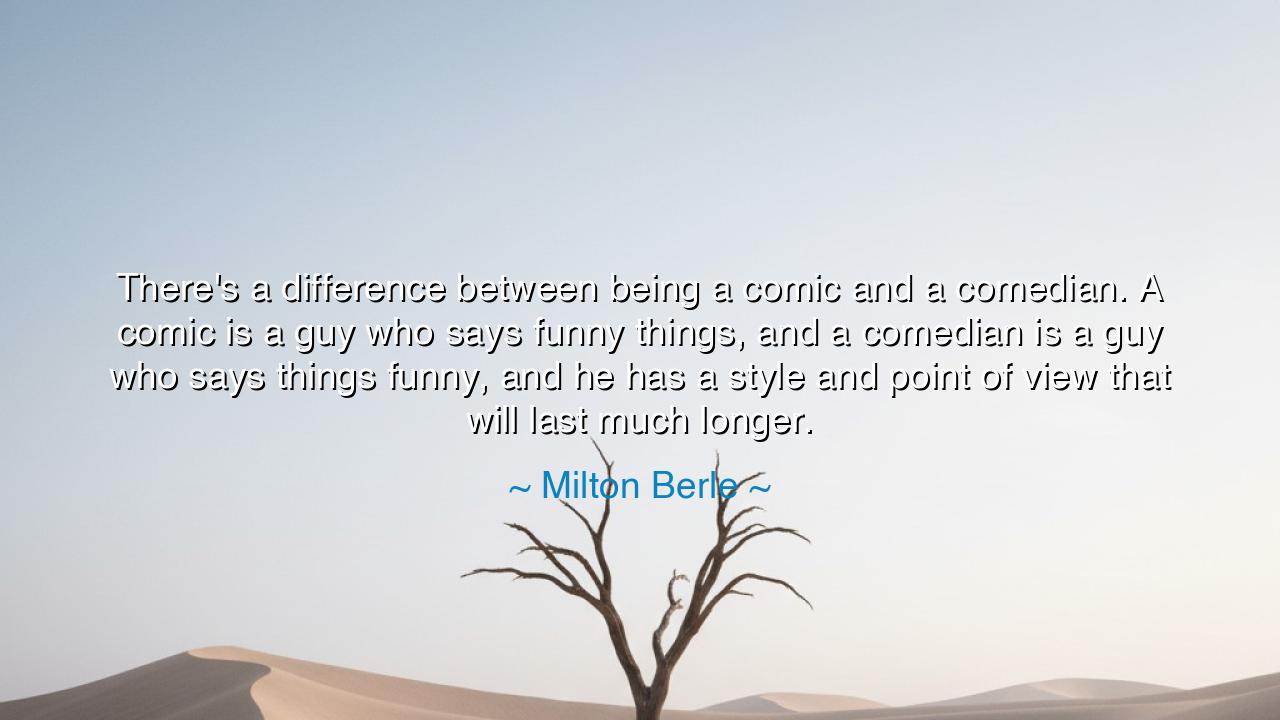
There's a difference between being a comic and a comedian. A
There's a difference between being a comic and a comedian. A comic is a guy who says funny things, and a comedian is a guy who says things funny, and he has a style and point of view that will last much longer.






“There’s a difference between being a comic and a comedian. A comic is a guy who says funny things, and a comedian is a guy who says things funny, and he has a style and point of view that will last much longer.” — Milton Berle
In these words lies a profound truth about art, authenticity, and endurance. The great Milton Berle, known as “Mr. Television,” did not merely speak of humor — he spoke of the soul of expression itself. For there is a chasm between those who speak to amuse and those who speak to reveal. The comic dances upon the surface of laughter, plucking from the air the easy joys that fade like morning mist. But the comedian, the true artist, dives into the depths of humanity. He finds within our sorrows, our follies, and our shared weakness something eternal. He says things funny, yes — but it is the truth behind his laughter that lasts much longer.
The ancients understood this difference well, though they named it by other words. The Greeks spoke of mimesis — imitation of life — but they also knew that the highest art was not mere mimicry, but insight. Aristophanes, the comic playwright of Athens, did not simply tell jokes. He wielded humor as a weapon and a mirror. Through laughter, he revealed the madness of men and the hypocrisy of the powerful. His laughter had teeth; it had wisdom. This is the mark of the comedian: he makes men laugh, and while they laugh, they begin to see.
To say funny things is to entertain. To say things funny is to transform the ordinary into the extraordinary. The comic depends upon cleverness — the spark of wit that amuses for a moment. But the comedian depends upon vision — the way he sees the world, and the courage with which he shares it. His style, his timing, his voice — these are not accidents of performance, but the fruits of a lifetime of observation. His laughter is not hollow; it is born from understanding. That is why Milton Berle’s words ring true even across generations: a comic makes us laugh, but a comedian makes us remember.
Consider the story of Charlie Chaplin, that silent sage of motion and mirth. He never spoke a word on screen, yet he said things funny — through movement, through expression, through the poetry of his craft. Beneath his humor lay deep compassion for the downtrodden, the forgotten, the poor. In “Modern Times,” he mocked the cold machinery of industry, yet his humor carried a tenderness that stirred the heart. Chaplin was not merely a comic; he was a comedian with a vision, a prophet disguised as a clown. His laughter endures not because of his jokes, but because of his humanity.
Thus, the origin of this wisdom lies not only in the craft of comedy, but in the very nature of creation itself. The world is filled with those who can entertain, but few who can enlighten. The same truth applies beyond the stage — in art, in speech, in life. There are those who repeat what others have said before, and there are those who speak from the depths of their own soul. The former may shine for a season, but the latter builds a legacy that time cannot erase. Style, authenticity, and perspective — these are the pillars of endurance.
The lesson, then, is not only for the comedian but for all who wish to create, to lead, or to touch hearts. Do not strive merely to say funny things, or clever things, or popular things. Strive to say things funny, to speak truth in a way that is uniquely yours. Develop a point of view that cannot be borrowed, a style that arises from your own trials, joys, and sorrows. The world hungers not for repetition, but for resonance — for voices that echo from the soul outward.
So, my child, remember this: the comic seeks laughter, but the comedian seeks connection. The comic’s flame burns bright and brief, but the comedian’s fire warms generations. Whatever your craft — whether you paint, write, lead, or simply live — seek not the applause of the moment, but the enduring light of authenticity. Speak your truth in your own way, and let your art — your laughter, your labor, your life — carry the voice of your spirit. For it is not what you say that will be remembered, but how you say it, and from what heart it was spoken.






AAdministratorAdministrator
Welcome, honored guests. Please leave a comment, we will respond soon